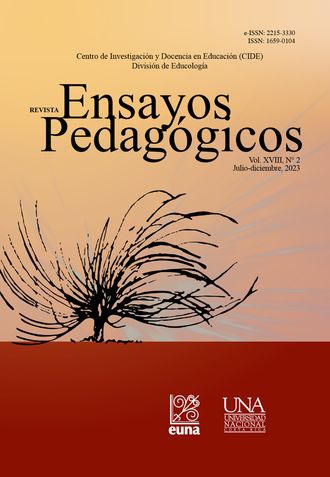Change of Paradigm: Towards a New Education and Vision of Life
DOI:
https://doi.org/10.15359/rep.18-2.6Keywords:
creActivity, culture, education, learning, paradigm, teaching, technology, virtualityAbstract
This essay shows an approach towards a change of paradigm in education, which presents the teaching-learning process from a different perspective, different from what is usually known as traditional education. Traditional education, as we know it at present time, has an orthodox type of approach, depending on the institution, with certain imposing rules for the learner, with no room for creAction and spontaneity. Education goes towards an emerging paradigm through art, creActivity, and virtuality. We got used to have the teacher as the owner of the class, in a behaviorist model, but in real life the learner must be the actor in the educational process. We are going towards a new order and a new civilization, towards new worlds where technology guides us in the age of information.
References
Assmann, H. (2002). Placer y ternura en la educación. Hacia una sociedad aprendiente. Narcea S. A. de Ediciones.
Bachoir, O. (1993). El amor. Alianza Francesa de Arequipa. https://es.scribd.com/document/400431293/Alberoni-F-1996-Enamoramiento-y-Amor-Nacimiento-y-Desarrollo-de-Una-Impetousa-y-Creativa-Fuerza-Revolucionaria-Barcelona-Gedisa
Capra, F. (1998). El punto crucial. Editorial Troquel.
Cornejo, J. (2012). Retos impuestos por la globalización a los sistemas educativos latinoamericanos. Revista Mexicana de Investigación Educativa, 17(52), 15-37. https://www.scielo.org.mx/pdf/rmie/v17n52/v17n52a2.pdf
Elliot, E. (2004). El arte y la creación de la mente. El papel de las artes visuales en la transformación de la consciencia. Ediciones Paidós.
Gallegos, R. (1997). Una sola conciencia. Enfoque holístico sobre el futuro de la humanidad (1.ª ed.). Editorial Pax México.
García, J. M. (2002). El préstamo lingüístico en la enseñanza de las lenguas. Problemas de etnocentrismo. ASELE. Actas XIII. Centro Virtual Cervantes. https://dialnet.unirioja.es/servlet/articulo?codigo=2800254
Gonçalves, S. (2010). Epistemología y educación: Síntesis general y educación artística en la génesis del auto-evaluación, conciencia y autonomía. Synesis, 2(2), 89-110. https://dialnet.unirioja.es/servlet/articulo?codigo=6356594
Hopenhayn, M. (2006). La educación en la actual inflexión epocal. Una perspectiva latinoamericana. Revista PRELAC, 2, 12-25. https://unesdoc.unesco.org/ark:/48223/pf0000145868
Mayorga, L. P., Bravo, K. D. y Ferreira, M. A. (2020). Construcción del conocimiento desde una visión retrospectiva de la ciencia y sus avances. Revista Ciencias de la Educación, 30(55), 259-274. http://servicio.bc.uc.edu.ve/educacion/revista/55/art13.pdf
Nemeth-Baumgartner, A. (1993). Macrometanoia. Un nuevo orden una nueva civilización. Editorial Sudamericana.
Ortega y Gasset, J. (1998). La barbarie del “especialismo”. En M. Gardner (coord.), Los grandes ensayos de la ciencia (pp. 91-96). Nueva Imagen.
Quevedo, C. R. (2020). La educación holística. Una oportunidad para transformar la realidad educativa en el siglo XXI. Revista Internacional de Educación y Aprendizaje, 8(3), 165-179. https://doi.org/10.37467/gka-revedu.v8.2522
Samper, E. (2002). Educación y globalización. En Educación y globalización: los desafíos para América Latina (vol. 1, pp. 43-49). Naciones Unidas/CEPAL/ECLA/OEI. https://silo.tips/download/educacion-y-globalizacion-los-desafios-para-america-latina
Sangrador, J. L. (1993). Consideraciones psicosociales sobre el amor romántico. Psicothema, 5(Sup.), 181-196. https://www.psicothema.com/pdf/1137.pdf
Zemelman, H. (2012). Pensar teórico y pensar epistémico: Los desafíos de la historicidad en el conflicto social. En S. Caba y G. García (eds.), Observaciones Latinoamericanas (pp. 19-29). Ediciones Universitarias de Valparaíso.
Downloads
Published
How to Cite
Issue
Section
License
Copyright (c) 2024 Ensayos Pedagógicos Journal

This work is licensed under a Creative Commons Attribution-NonCommercial-NoDerivatives 4.0 International License.
Ensayos Pedagógicos is subscribed to the Attribution-NonCommertial-NoDerivatives 4.0 International Creative Commons Licence, which allows both authors and readers to freely download, store, copy, and distribute the final approved publisehd version of the manuscript (post-print) as long as this is done without commercial purposes, no derivative works are generated, and the source and author are mentioned. As well, Ensayos Pedagógicos declares that authors will remain the rightful owners of the copyrights of their work in perpetuity.







